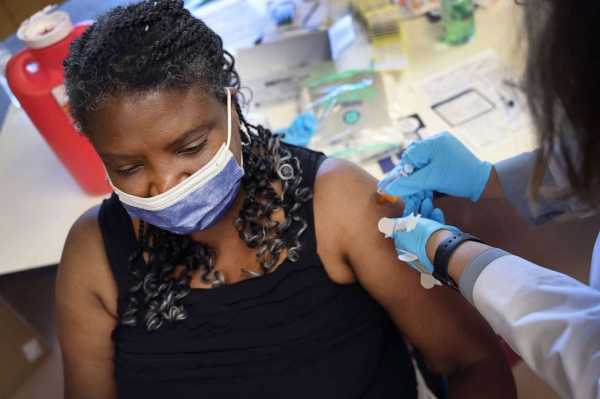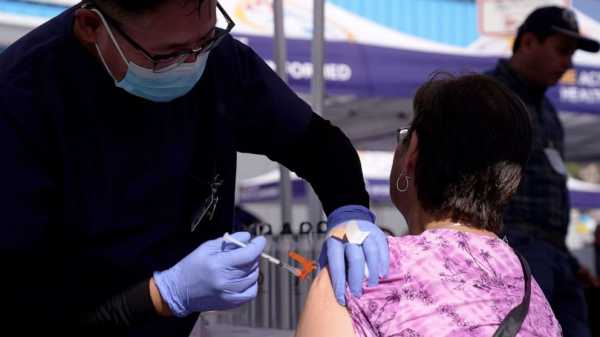The number of flu cases, hospitalizations and deaths this season are rapidly increasing, according to data released Friday by the Centers for Disease Control and Prevention.
So far this season, there have been at least 4.4 million illnesses, 38,000 hospitalizations and 2,100 deaths from influenza.
The numbers are about 1.5 times higher than the 2.8 million illnesses, 23,000 hospitalizations and 1,300 deaths reported the prior week.
MORE: Weekly flu cases, hospitalizations and deaths double for 2nd week in a row
Additionally, the cumulative hospitalization rate currently sits at 8.1 per 100,000 — up from 5 per 100,000 the previous week — which is the highest at this point in the season since statistics began being recorded in the 2010-11 season.
The data also shows that 8,707 new patients were admitted to hospital this past week with flu complications, according to the CDC, compared to 6,465 the previous week.

A woman gets an influenza vaccine during an event hosted by the Chicago Department of Public Health at the Southwest Senior Center on Sept. 09, 2022 in Chicago. The vaccines were being offered along with pneumonia vaccines and the recently authorized COVID-19 booster vaccine, which protects against the original SARS-CoV-2 virus and the more recent omicron variants, BA.4 and BA.5 during the event. Scott Olson/Getty Images
Two pediatric deaths from the flu were recorded last week bringing the total this season to seven, the CDC said.
This early flu season is additionally concerning with the pediatric surge of respiratory illnesses already filling up 78% of pediatric beds, according to data from the Department of Health and Human Services.
Visits to health care providers for flu are currently concentrated in younger people. The greatest percentage of visits for flu-like illness are for those under 5 years old at 15.9% while the second highest is between ages 5 and 24 at 9.9%.
Experts from The American Academy of Pediatrics and the Children's Hospital Association have already sent President Biden a letter urging him to declare a health emergency, given the pediatric surge of respiratory illnesses and the continuing children's mental health emergency.
MORE: Why this could be the worst flu season in the US in more than a decade
Currently, 14 states as well as New York City and Washington, D.C., are reporting "very high" levels of influenza-like activity. In addition, 13 states as well as Puerto Rico are reporting "high" levels and six states are reporting "moderate" levels.
Last year at this time, all but one state was reporting low or moderate levels. Only New Mexico was reporting high levels.
However, despite the increase in cases, the CDC said the influenza viruses tested in laboratories appear to match this season's influenza vaccine well and the agency is recommending Americans who haven't been vaccinated do so as soon as possible.
Earlier this week, Dr. Ashish Jha, the White House's COVID-19 response coordinator, told "Good Morning America" that this year's flu vaccine appears to be a good match to the dominant flu virus strain in circulation.
"It's actually quite effective," he said. "It is not every year, but this year it really looks like it's a very good match."

A woman is given a flu vaccine by nurse Gigi Urcia at the L.A. Care and Blue Shield of California Promise Health Plans’ Community Resource Center where they were offering members and the public free flu and COVID-19 vaccines, Oct. 28, 2022, in Lynwood, Calif.Mark J. Terrill/AP
However, experts are worried about the strain on the hospital system.
"We're dealing with multiple threats simultaneously," said Dr. John Brownstein, chief innovation officer at Boston's Children's Hospital and an ABC News medical contributor. "We're also experiencing rhinovirus, parainfluenza, enterovirus right now, behavioral health issues, there's a lot of things we're dealing with."
Additionally, experts note the burden of RSV doesn't exclusively apply to children.
"It's sobering to realize that the majority of deaths due to RSV occur in adults. We need to expand our understanding of RSV, and its impact," Dr. William Schaffner, professor of medicine for the department of infectious diseases at Vanderbilt University School of Medicine, said at an Infectious Diseases Society of America briefing Friday.
As the holidays approach, experts are warning to take caution when traveling to see family and friends.
MORE: Kansas elementary school temporarily closes due to rise in respiratory illnesses
"Thanksgiving often represents a super-spreading event. You have families gathering new people moving, increasing mobility, and it usually adds acceleration to the flu," said Brownstein.
Experts say in addition to getting vaccinated, you can practice healthy habits.
"All the protocols and practices that we've experienced COVID still apply, you know, good respiratory hygiene, handwashing, masking as needed, stay home if you are sick, stay away from those that are sick, and potentially staying out of large gatherings," said Brownstein.
Sourse: abcnews.go.com






